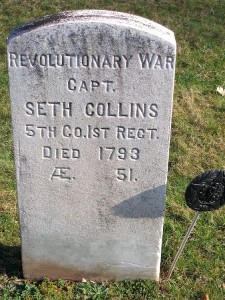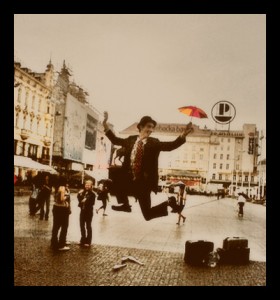KFWB Los Angeles program director Chuck Blore explains how Danny Dark went from “DJ” to one of the most influential commercial voice over artists of the 20th Century.
October, 1996 (continued):
On Halloween, I found myself booked to present How To Create Maximum Impact Radio Advertising for Paul Taff and the Connecticut Broadcasters Association’s convention near Hartford.
This was quite exciting for me, because it was the first time I had ever been asked to conduct a seminar in my home state.
The flight from Chicago to Bradley Field — oops, sorry; these days it’s called Bradley International Airport — left 90 minutes late.
Once we were aloft, it was announced that due to bad weather we would have to land not at Bradley, which is located between Hartford and Springfield, Massachusetts, but instead at Boston….a couple of hours’ drive from Hartford.
Everyone on the plane immediately scrambled for the in-flight telephones to try to change their plans. I figure GTE made several thousand dollars on that one flight…and then we ended up at Bradley after all.
I spent much of the day after my seminar for the CBA wandering around my old hometown. A long exploratory visit in the local cemetery (which dates back to the American Revolution) offered an unexpected lesson in West Hartford history.


Many of the surnames that repeatedly turned up on gravestones are the same names that adorn the city’s streets: Brace, Griswold, Bishop (a name long-since memorialized via a shopping intersection called “Bishop’s Corner”).
On the following day I presented a day-long version of Air Personality Plus+, attended by nearly 100 radio personalities and program directors from the New England area.
All in all, a very satisfying trip.
“I’m the sports director of a small market radio station that broadcasts lots of ballgames. One of my duties is to write liners and promos for the upcoming games.
“My program director and general manager require me to submit the promos and liners for approval before going on the air. And nine times out of ten they get thrown back in my face as being ‘too negative.’
“As an example I once wrote:
‘The (Local) Panthers try to diffuse the (Out of Town) Rockets.’
“My PD and GM both said I couldn’t use it because it sent a ‘negative connotation’ to the listener.
“I’ve gotten to the point where I’m simply writing, ‘(Local Team) plays So-And-So this Friday Night….’
“The promos have gone from what I think are rather creative to bland and boring.
“Am I getting worked up over nothing, or do I have a gripe?”
As a PD, I would want to make sure that everything that airs on my station supports the brand I’m trying to build or maintain.
So I’d do the following:
1) I’d screen all the promos myself.
2) Once I’d developed confidence in the ability and willingness of my sports director to produce the kinds of promos that conform to the guidelines I’ve laid down, I’d delegate the screening process to someone else (e.g., Assistant Program Director) — making sure that person understands his job is not to nit-pick or criticize; it’s only to advise me if he thinks there’s a spot I should hear before it airs.
I would not, however, create psychosis among my staff by requiring them to clear promos with both the program director and the general manager.
Trying to please one person is hard enough.
Trying to please two different sensibilities leads to severe headaches, intense dyspepsia, alcoholism, and early death.

I’ve heard people say the goal of a radio commercial is to entertain people.
One would-be expert actually proclaimed, “A radio commercial must be entertaining, or it won’t work.”
Good grief.
Someone asked me: “So you’re against entertainment in commercials?”
Absolutely not. I’m against entertainment (and anything else) that is irrelevant to the sales process.
The model that most people follow when creating commercials — including most award-winning commercials — is: “I’ll do a little song & dance to entertain them, and then I’ll try to sell them something.”
And it used to work that way. 120 years ago, some guy would show up in a new town, set up his table, and launch into a juggling routine or a magic act.
A crowd would gather.
And then the entertainer would go to the back of his tent and the snake oil salesman would come out and deliver his finely crafted and well-rehearsed sales pitch.
They sold an awful lot of snake oil that way.
But that’s not how it works with electronic media advertising in the 21st Century.
Remember, Advertising Is Mass Salesmanship.
Question for Radio Sales Managers
Do you instruct your account executives to conduct sales calls by telling 27 jokes and then asking, “Do you want to buy some commercials?”
If you entertain in a commercial, the entertainment has to be inextricably woven around the sales message. You should not be able to remove the entertainment without removing the sales message itself.
That’s a very easy and extremely effective test to apply to your commercial: “Is it possible to remove the entertaining elements without also removing the sales message?”
All too often, the answer is yes.
I’ve lost count of the number of award-winning commercials that won those awards because of their entertainment value…even though you could have replaced the product or service that was being advertised with practically any other product or service without touching the entertainment.
The good news is you don’t need to understand how the different parts of the brain work. You don’t need to learn pseudo-scientific jargon. All you need to understand is how radio advertising works. And it works like this:
1. Identify a desire that will be fulfilled or a problem that will be solved by your client’s product or service.
Example:
Alka-Seltzer: “I can’t believe I ate the whole thing.”
(Have you ever had that problem?)
Example:
Federal Express: “When it absolutely, positively has to be there overnight.”
Those are common, real problems…and those two advertisers offered real solutions. Simply, clearly, and directly.
2. Show the consumer how you can fulfill his desire or solve her problem.
3. Deliver your message in a way that involves the listener.
4. Make sure your message is absolutely clear…with a single clear message.
(Ninth in a series)
A Loyal Reader Asks:
“How can you teach young jocks to ‘be real’ — to break out of the ‘I’m a DJ’ persona and become communicators?”
Schedule monthly meetings for your entire air staff during which you play only “good” airchecks of other jocks.
Have your jocks tell what what elements were good, and why.
Don’t limit yourself to a particular format. Good radio is scarce enough that it should be celebrated regardless of the type of music or target audience.



